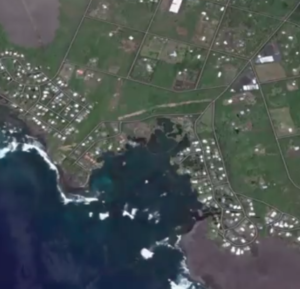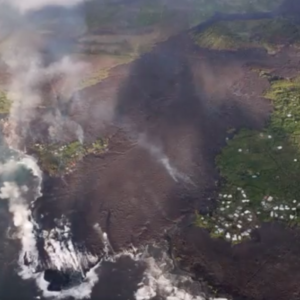 A little over a month ago, if you had asked a homeowner on Hawaii Island with property in Lava Zone 1, how they felt about their investment, they may have told you that for the affordable cost of the land, it was worth the risk. Sadly, 30 days later with over 600 homes destroyed by lava in the Puna District, now homeowners may be asking, “Do I still have to pay property taxes on my land if it is covered in lava?” Mainlanders and Hawaii residents watched in wonder as the lava flow filled in Kapoho Bay this week and watched the flow stretching out over a mile from the original shoreline with new oceanfront land. Many asked, “Who owns that new land?”
A little over a month ago, if you had asked a homeowner on Hawaii Island with property in Lava Zone 1, how they felt about their investment, they may have told you that for the affordable cost of the land, it was worth the risk. Sadly, 30 days later with over 600 homes destroyed by lava in the Puna District, now homeowners may be asking, “Do I still have to pay property taxes on my land if it is covered in lava?” Mainlanders and Hawaii residents watched in wonder as the lava flow filled in Kapoho Bay this week and watched the flow stretching out over a mile from the original shoreline with new oceanfront land. Many asked, “Who owns that new land?”
So what happens to the land when a lava flow covers it? Does the state or county claim title to it? If so, do they compensate the previous owners? What about if the land is only partially covered by lava?
Lisa Miura, Hawaii County’s real property tax administrator provided these answers:
The government does not claim ownership of all land covered by lava; the private property owner retains title even as the land’s assessed value plummets to zero.
As for that new oceanfront land? The state claims new coastal land created by volcanic eruptions. This ownership applies to lava flows extending seaward from the coastline — increasing the size of Hawaii island — not to those that cover the existing property.
There may be cases where the government eventually assumes control of private land inundated by lava, but it is not common practice. “If the property is abandoned, then eventually it could be sold at tax sale. However, we have not had a tax sale recently in this area as the values have been less than what was owed on taxes. The county and state have not been automatically assuming ownership,” Miura said in an interview with the Honolulu Star-Advertiser.
The government does not claim ownership of all land covered by lava; the private property owner retains title even as the land’s assessed value plummets to zero.
According to the county, Hawaii County does reduce or eliminate real property taxes for property owners within a lava inundation zone, and is doing so for those devastated by Kilauea’s current eruption, which has destroyed more than 500 homes in Lower Puna, Kapoho and Vacationland at this point, and made many more inaccessible.
How much is the assessed land value for fresh lava? The assessed value of the property would fall to zero for 2018, and the owner would pay no property tax, according to Miura. Any property assessed at $500 or less is exempt from property taxes, under a Hawaii County law approved last year. Presumably, such properties would continue to be assessed at $500 or less for years to come. And then, like some homeowners in Kalapana, rebuilding could begin for those residents willing to take the risk again.
County authorities are making adjustments for the current tax year as well as the upcoming tax year, according to Hawaii County’s Real Property Office, which posted an FAQ on the topic at their website here. Not every affected property owner will get a credit, because of the $200 minimum tax previously required.
 An article written for the San Francisco Examiner in 2008 talks about people’s views of buying property on a lava field..and oddly enough, one of them is our own Mayor of Hawaii County, Harry Kim, who has a home that is located near Kapoho and was the Civil Defense Director when Kilauea first started erupting in January of 1983.
An article written for the San Francisco Examiner in 2008 talks about people’s views of buying property on a lava field..and oddly enough, one of them is our own Mayor of Hawaii County, Harry Kim, who has a home that is located near Kapoho and was the Civil Defense Director when Kilauea first started erupting in January of 1983.
If you are considering purchasing a home on Hawaii Island, you can check which lava zone it is in by contacting LUVA Real Estate for an up to date lava zone map. We wrote about lava zones and for lava zones 3-9, which cover most of West Hawaii, getting a mortgage and insurance is not an issue since we are not directly affected by Kilauea volcano.